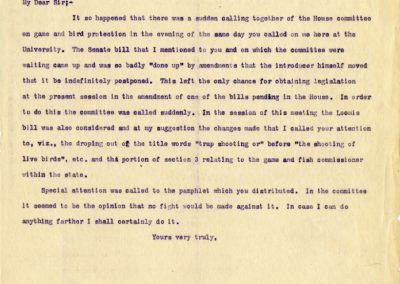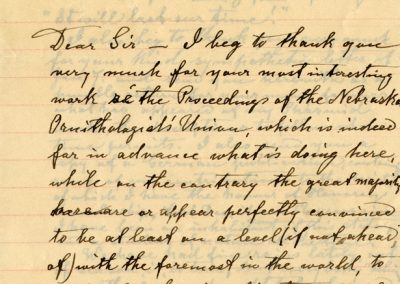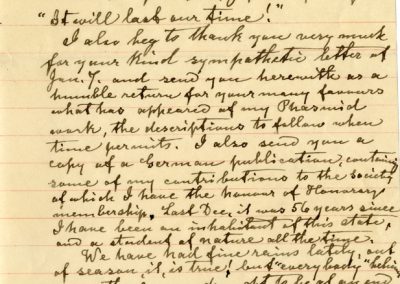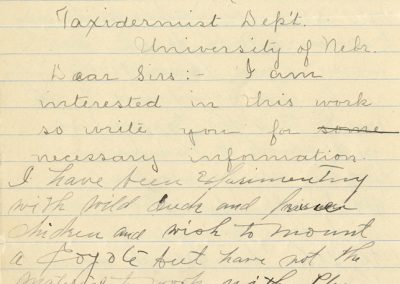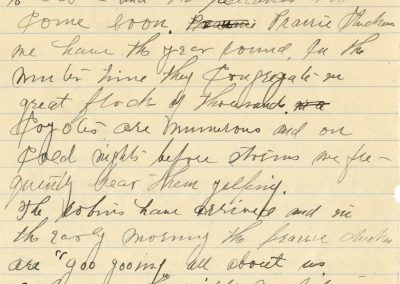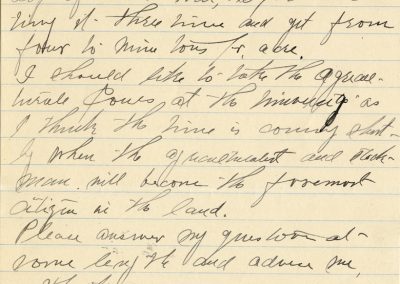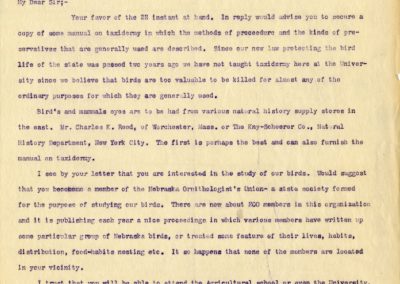Great Nebraska
Naturalists and ScientistsNebraska Ornithologists’ Union
Letters, 1903, March
1903, Mar. 7
Lincoln, Nebr., March 7 , 1903.
Mr Alfred Millard, Omaha, Nebr.
My Dear Sir:- It so happened that there was a sudden calling together of the House committee on game and bird protection in the evening of the same day you called on me here at the University. The Senate bill that I mentioned to you and on which the committee were waiting came up and was so badly “done up” by amendments that the introducer himself moved that it be indefinitely postponed. This left the only chance for obtaining legislation at the present session in the amendment of one of the bills pending in the House. In order to do this the committee was called suddenly. In the session of this meeting the Loomis bill was also considered and at my suggestion the changes made that I called your attention to, vis., the droping out of the title words “trap shooting or” before “the shooting of live birds”, etc., and the portion of section 3 relating to the game and fish commissioner within the state.
Special attention was called to the pamphlet which you distributed. In the committee it seemed to be the opinion that no fight would be made against it. In case I can do anything farther I shall certainly do it. Yours very truly,
1903, Mar. 18
Norwood, S. Australia, March 10. 1903.
Prof. Lawrance Bruner University of Nebraska Lincoln, Nebr. U. S. A.
Dear Sir—I beg to thank you very much for your most interesting work in the Proceedings of the Nebraska Ornithologist’s Union, which is indeed far in advance what is doing here, while on the contrary the great majority here are or appear perfectly convinced to be at least on a level (if not ahead of) with the foremost of the world, to judge by the disinclination of rulers & people to take example & learn from the older countries. Even when laws are passed, they seem to be only there, to be ignored, or if action is forced upon the police, the magistrates let off the
1903, Mar. 22
MAR 24 Rec’d MAR 25 Ans’d
Comstock, Nebr. March 22, 1903 Taxidermist Dep’t. Unviersity of Nebr.
Dear Sirs:- I am interested in this work so write you for necessary information. I have been experimenting with wild duck and prairie chicken and wish to mount a coyote but have not the material to work with. Please send instructions, how to stuff and mount my specimens and where and how to get the eyes and what chemicals or drugs are necessary I should like to take up this
1903, Mar. 25
Lincoln, Nebr., March 25, 1903. Mr. C. H. Reed, Comstock, Nebr.
My Dear Sir:- Your favor of the 22 instant at hand. In reply would advise you to secure a copy of some manual on taxidermy in which the methods of proceedure and the kinds of preservatives that are generally used are described. Since our new law protecting the bird life of the state was passed two years ago we have not taught taxidermy here at the University since we believe that birds are too valuable to be killed for almost any of the ordinary purposes for which they are generally used.
Bird’s and mammals eyes are to be had from various natural history supply stores in the east. Mr. Charles K. Reed, of Worchester, Mass. or The Kay-Scheerer Co., Natural History Department, New York City. The first is perhaps the best and can also furnish the manual on taxidermy.
I see by your letter that you are interested in the study of our birds. Would suggest that you become a member of the Nebraska Ornithologist’s Union- a state society formed for the purpose of studying our birds. There are now about 200 members in this organization and it is publishing each year a nice proceedings in which various members have written up some particular group of Nebraska birds, or treated some feature of their lives, habits, distribution, food-habits nesting etc. It so happens that none of the members are located in your vicinity.
I trust that you will be able to attend the Agricultural school or even the University. Yours very truly,
